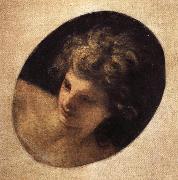Wholesale Oil Painting No Minimum |
|||||||||||
|
|
|||||||||||

|
|||||||||||
|
|
|
||||||||
Gian Lorenzo BerniniItalian sculptor , b. 1598, Napoli, d. 1680, Roma ,Italian architect and artist credited with creating the Baroque style of sculpture. He began his career working for his father, a sculptor. Among his early sculptures are Apollo and Daphne (1622 -C 24) and an active David (1623 -C 24). Under the patronage of Urban VIII, the first of eight popes he was to serve, he created the baldachin over the tomb of St. Peter in Rome. Bernini's architectural duties increased after 1629, when he was appointed architect of St. Peter's Basilica and the Palazzo Barberini. His works often represent a fusion of architecture and sculpture, as in the Cornaro Chapel, in Santa Maria della Vittoria, Rome, with its celebrated theatrical sculpture, The Ecstasy of St. Teresa (1645 C 52). His greatest architectural achievement is the colonnade enclosing the piazza before St. Peter's. |
||||||||
|
|
||||||||
Head of a Young Man
Head of a Young Man Painting ID:: 29990 |
mk67
Oil on canvas
24 13/16x24 3/8in
Uffizi,Gallery
mk67 Oil on canvas 24 13/16x24 3/8in Uffizi,Gallery |
|||||||
|
|
||||||||
|
Andrea del Sarto b.July 16, 1486, Florence d.Sept. 28, 1530, Florence Italian Andrea del Sarto Galleries Andrea del Sarto (1486 ?C 1531) was an Italian painter from Florence, whose career flourished during the High Renaissance and early-Mannerism. Though highly regarded by his contemporaries as an artist "senza errori" (i.e., faultless), he is overshadowed now by equally talented contemporaries like Raphael. Andrea fell in love with Lucrezia (del Fede), wife of a hatter named Carlo, of Recanati; the hatter dying opportunely, Andrea married her on 26 December 1512. She has come down to us in many a picture of her lover-husband, who constantly painted her as a Madonna and otherwise; even in painting other women he made them resemble Lucrezia. She was less gently handled by Giorgio Vasari, a pupil of Andrea, who describes her as faithless, jealous, and vixenish with the apprentices; her offstage character permeates Robert Browning's poem-monologue "Andrea del Sarto called the 'faultless painter'" (1855) . He dwelt in Florence throughout the memorable siege of 1529, which was soon followed by an infectious pestilence. He caught the malady, struggled against it with little or no tending from his wife, who held aloof, and he died, no one knowing much about it at the moment, on 22 January 1531, at the comparatively early age of forty-three. He was buried unceremoniously in the church of the Servites. His wife survived her husband by forty years. A number of paintings are considered to be self-portraits. One is in the National Gallery, London, an admirable half-figure, purchased in 1862. Another is at Alnwick Castle, a young man about twenty years, with his elbow on a table. Another youthful portrait is in the Uffizi Gallery, and the Pitti Palace contains more than one. Head of a Young Man 1520 |
||||||||
|
|
||||||||
|
Prev Next
|
||||||||
|
|
||||||||
|
Related Paintings to Andrea del Sarto :. |
||||||||
|
|
||||||||
|
CONTACT US |

